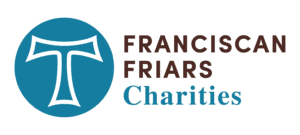
Midtown Manhattan is far from the border. But it is an epicenter of the migrant crisis, as more than 200,000 migrants have come to New York City over the past two years. Many of them trekked through Central America to Texas and Arizona, and then were sent on buses into our country’s largest city.
Fr. Julian Jagudilla, OFM, is, like Franciscans have done for centuries, in the middle of helping migrants in need.
Out of the Migrant Center at St. Francis of Assisi Church, Fr. Julian directs a program that began with meeting the basic needs of migrants who began arriving in the city two years ago. The first step was clothing as many arrived from tropical climes, such as Venezuela, ill-equipped to face a harsh New York winter.
Now the center, while continuing to meet material needs, has moved on to other projects. One of the most important is assisting migrants in making their claims for asylum. Fr. Julian is assisted by three part-time staffers and 60 volunteers.
Volunteers assist migrants in filling out the 12-page form, available in Spanish, French and Arabic. The migrants have roots not only in Venezuela, but also in African countries such as Senegal and Mauritania. To be eligible for asylum, they need to prove that they are fleeing persecution and/or violence in their homelands. It is a claim buttressed by reports of gang violence and political repression in Venezuela and other countries.
Simply coming for a better life is not a legal reason to claim asylum. The migrants who seek legal status must prove they have been persecuted or face imminent danger. As immigration courts are clogged, their hearings are often years way. In the meantime, it is vital for migrants to get work permits to allow them to support themselves while they wait for their cases to be heard.
Fr. Julian, a native of the Philippines, has his own immigrant story, having come to the United States as a religious worker in the early 1990s. He entered the Franciscan community in 2003.

He knows that assisting these migrants is not popular in some quarters during this volatile election year. But the Franciscan charism to help the poor compels the ministry.

“Some people are angry that we are helping them,” he said. Sometimes he hears the people on the street complain that the migrants should go back to where they came from. “They see them as competitors, but the reality is that they are a new group that needs help,” he said.
He hopes that the nation’s immigration system can emerge from this election season with a greater commitment to welcome and justice.
“Hopefully there will be a major reform in our immigration system, changing to something that is just and humane,” he said. Meanwhile, in the Franciscan manner, he will continue to assist migrants in need.

